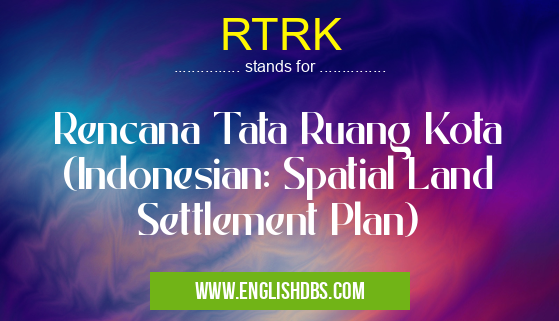What does RTRK mean in INDONESIAN
RTRK (Rencana Tata Ruang Kota) is an Indonesian term that translates to "Spatial Land Settlement Plan". It is a comprehensive plan that guides the development and management of land use within a city or urban area. The RTRK outlines the spatial distribution of different land uses, including residential, commercial, industrial, and public areas. It also includes regulations and guidelines for building design, infrastructure development, and environmental protection.

RTRK meaning in Indonesian in International
RTRK mostly used in an acronym Indonesian in Category International that means Rencana Tata Ruang Kota (Indonesian: Spatial Land Settlement Plan)
Shorthand: RTRK,
Full Form: Rencana Tata Ruang Kota (Indonesian: Spatial Land Settlement Plan)
For more information of "Rencana Tata Ruang Kota (Indonesian: Spatial Land Settlement Plan)", see the section below.
Key Elements of RTRK
- Land Use Zoning: The RTRK divides the city into different zones, each with its own designated land uses. This ensures that land is used in a manner that is compatible with its surrounding environment and promotes sustainable development.
- Building Regulations: The RTRK establishes building codes and regulations that specify the height, density, and design standards for buildings in different zones. These regulations help to ensure the safety, aesthetics, and functionality of the built environment.
- Infrastructure Planning: The RTRK identifies the need for and location of essential infrastructure, such as roads, bridges, utilities, and public transportation. It coordinates the development of these infrastructure systems to meet the demands of the growing population.
- Environmental Protection: The RTRK incorporates measures to protect the natural environment and mitigate the impacts of development. This includes the preservation of green spaces, the management of water resources, and the control of air and noise pollution.
Benefits of RTRK
- Orderly Urban Development: The RTRK provides a framework for orderly urban development, ensuring that land is used efficiently and in a sustainable manner.
- Improved Infrastructure: The RTRK helps to plan and coordinate the development of essential infrastructure, improving the quality of life for residents.
- Environmental Protection: The RTRK incorporates environmental considerations into the planning process, helping to protect natural resources and mitigate the impacts of development.
- Increased Investment: A well-developed RTRK can increase investor confidence by providing clear guidelines for land use and development.
Essential Questions and Answers on Rencana Tata Ruang Kota (Indonesian: Spatial Land Settlement Plan) in "INTERNATIONAL»INDONESIAN"
What is the purpose of RTRK?
RTRK provides a comprehensive framework for the spatial planning and development of a city. It guides the use, allocation, and management of land resources to ensure sustainable and orderly urban growth.
Who is responsible for developing and implementing RTRK?
The local government authority is responsible for developing and implementing RTRK with the input and participation of stakeholders, including residents, businesses, and community organizations.
What are the key elements of RTRK?
RTRK typically includes zoning maps, land use regulations, development guidelines, and environmental protection measures. It defines the designated areas for various purposes, such as residential, commercial, industrial, open space, and infrastructure.
How does RTRK benefit the city and its residents?
RTRK promotes orderly and sustainable urban development by preventing land use conflicts, ensuring adequate infrastructure and public services, protecting the environment, and enhancing the overall quality of life for residents.
How can citizens participate in the RTRK planning process?
Citizens can participate in the RTRK planning process through public hearings, community meetings, and stakeholder engagement initiatives. Their input helps ensure that the plan reflects the needs and aspirations of the community.
What is the difference between RTRK and zoning regulations?
RTRK provides a broad framework for land use planning at the city level, while zoning regulations are more specific and enforceable rules that govern the use and development of individual properties. RTRK sets the overall vision, and zoning regulations implement that vision through detailed regulations.
Final Words: The RTRK is an essential tool for managing the growth and development of cities in Indonesia. It provides a comprehensive framework for land use planning, building regulations, infrastructure development, and environmental protection. By implementing the RTRK, cities can ensure the creation of sustainable, livable, and prosperous urban environments.
